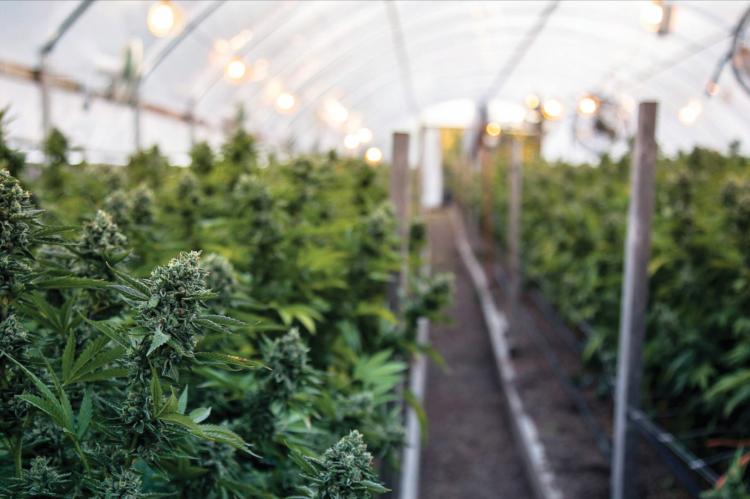Cannabis Waste Management: How to Solve the Growing Bio-Waste Problem
The one problem that comes with cannabis industry growth—it creates a whole lot of waste.
Washington State alone created almost 2 million pounds of plant waste in the first three years cannabis was legalized. All that waste has to go somewhere, right?
Properly managing waste may not be the most fun or sexy activity, but it’s incredibly important if we care about the health of our communities and the environment as a whole, especially with the growing threat of climate change.
The good news is, there are a handful of technological innovators out there that are working on alleviating the high amount of waste that is produced from growing cannabis.
In this exclusive series, we’ll examine a few of these ingenious tech ideas.
THE CANNABIS INDUSTRY’S GROWING WASTE PROBLEM
The two primary sources of waste in the cannabis industry are plant waste from cultivation facilities and packaging waste from cannabis products.
Let’s start with plant waste.
Unfortunately, government regulations don’t make it easy for the cannabis industry to be sustainable. Colorado, for instance, requires cannabis waste to be mixed 50/50 with an approved non-consumable material before it can be sent to a landfill.
The reason waste is rendered unusable and unrecognizable is to eliminate any concern that someone might go dumpster-diving for discarded products. In 2017, a teenager reported becoming ill after consuming a product stolen from the dumpsters at MCR Labs outside of Boston.
The result of these safeguards is twice the amount of waste being created and going into landfills.
There are other ways to manage organic cannabis waste more sustainably, however. Cannabis cultivators can take matters into their own hands and make compost out of the waste, or they can outsource the problem to sustainable companies.
FERMENTATION WITH THE BOKASHI METHOD
Bokashi is a Japanese term loosely translated to “fermented organic matter.”
Cannabis cultivators have long been using this method as a solution to manage organic cannabis waste sustainably. It doesn’t produce any greenhouse gases or heat, and the end result of the fermentation process is organic nutrient-rich fertilizer that can be recycled back into the soil, resulting in dramatic reductions in nutrient waste and improved plant performance. Plus, no more waste gets dumped into landfills, making the bokashi method a win-win for the grower and the environment.
Cannabis growers can perform the bokashi method using a simple 55-gallon drum, but more extensive operations require more scalable technology.
A company called Bokashi Cycle has created such scalable tech solutions for this reason. In addition to offering small-scale fermenting kits, they’ve also invented two solutions that are ideal for more significant operations that produce a tremendous amount of cannabis waste.
The first solution is a marijuana granulating machine that’s specifically designed to granulate and mince cannabis waste materials such as stalks, stems, and roots. The pulverized material gets sent into barrels that can hold about 400 pounds of cannabis waste.
Once the cannabis waste has been processed, it can then be transferred to their second solution: a fermenting bin that can hold up to 2 tons of waste at a time. These bins are made of ultra-strong powder-coated steel and come with an anaerobic seal top.
This configuration allows cannabis producers to quickly and easily turn vast amounts of organic waste material into high-quality bio pulp that can be either recycled back into their own soil as a fertilizer or sold to other growers at a profit.
Not only growers can benefit from such solutions, either. Dispensaries, distributors, and processors can all eliminate their cannabis waste from going into landfills and instead produce organic fertilizer using the bokashi method, whether they are a small one-person operation or an industrial-sized enterprise.
TURNING WASTE INTO ENERGY
Composting and fermenting cannabis waste into a potent fertilizer is an excellent solution for cannabis operations, but it isn’t the only solution out there.
One Canadian company, Eco-Growth, has created a unique waste-to-energy solution to the cannabis waste problem.
Eco-Growth’s Organic Reactors (EGOR) and Biomass Eco-Boilers can turn cannabis waste into a combustible fuel source that can heat the water in a grow op’s boiler system, saving the business energy costs. Eco-Growth’s technology is carbon-neutral and fully complies with new Canadian organics by-laws.
The sustainable tech can process 125 to 200 pounds of organic waste per day and reduces the weight of the waste by up to 80%. The resulting dry, odor-free biofuel can then be combusted to create hot water or steam.
THE CANNABIS INDUSTRY’S CHOICE
The cannabis industry has a vital choice to make, and we must make it fast, as the growing threats of climate change grow closer with each passing day.
Cannabis cultivators, distributors, and dispensaries can choose to keep dumping their organic waste in landfills that are already bursting at the seams — wasting precious energy, time, and money in the process. Or they can make the sustainable choice of investing in smart alternative waste management technologies that can reduce operational costs and even create new streams of revenue — all while being better for the environment. If any cannabis business cares about growing their bottom line ethically and sustainably, the decision to make is clear.
- Log in to post comments

